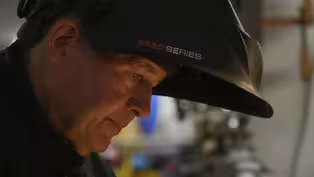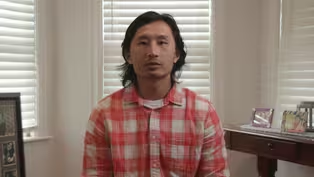
Weekly Insight
Clip: Season 5 Episode 41 | 5m 10sVideo has Closed Captions
CVS Health plans to lay off 632 workers employed at its Woonsocket-based headquarters.
More than 600 employees who are based out of CVS Health’s Woonsocket headquarters will lose their jobs in December. WPRI 12’s Politics Editor Ted Nesi and Rhode Island PBS Weekly’s Michelle San Miguel discuss the upcoming layoffs. They also explain why Rhode Island voters are being asked if the state should hold a constitutional convention.
Problems playing video? | Closed Captioning Feedback
Problems playing video? | Closed Captioning Feedback
Rhode Island PBS Weekly is a local public television program presented by Ocean State Media

Weekly Insight
Clip: Season 5 Episode 41 | 5m 10sVideo has Closed Captions
More than 600 employees who are based out of CVS Health’s Woonsocket headquarters will lose their jobs in December. WPRI 12’s Politics Editor Ted Nesi and Rhode Island PBS Weekly’s Michelle San Miguel discuss the upcoming layoffs. They also explain why Rhode Island voters are being asked if the state should hold a constitutional convention.
Problems playing video? | Closed Captioning Feedback
How to Watch Rhode Island PBS Weekly
Rhode Island PBS Weekly is available to stream on pbs.org and the free PBS App, available on iPhone, Apple TV, Android TV, Android smartphones, Amazon Fire TV, Amazon Fire Tablet, Roku, Samsung Smart TV, and Vizio.
Providing Support for PBS.org
Learn Moreabout PBS online sponsorship- Ted, welcome back.
There is no company in Rhode Island bigger than CVS Health.
We're talking about more than 7,000 employees in the state when you factor in its Woonsocket headquarters, its drugstores, and its distribution facilities.
So clearly it's alarming to state leaders when they hear that CVS Health is having financial trouble.
- Absolutely, Michelle, and I think it's important to step back as we think about the current moment for CVS.
You know, CVS has changed a lot over the years.
They were founded, obviously, as a drugstore chain.
We all think of the pharmacies when we think of CVS.
That's why they're in Woonsocket.
But in the 2000s, they acquired Caremark, which is a PBM, a pharmacy benefit manager, does the drug formulary thing for insurers, and then since then, they've also acquired Aetna, the big insurance company.
So all that has turned them into, first of all, one of the 10 biggest companies in the United States, headquartered in Rhode Island, but then, also, their goal has been to transform from a retailer, from a drugstore chain into a healthcare company, and the problem is now it's not clear to Wall Street that that strategy has really worked.
- And as you're talking about, investors are clearly concerned about the company's strategy and their financial results, and the company's CEO, Karen Lynch, is feeling the pressure, along with her board of directors.
- They certainly are.
We've seen already a wave of layoffs previously.
Now, they've recently announced CVS will be seeking another $2 billion in savings.
That's gonna include layoffs of almost 3,000 people.
We've just learned that they had to tell the state of Rhode Island that about 150 of those people are based at the Woonsocket headquarters, and even more than that, report to someone at the Woonsocket headquarters.
But I'd argue even bigger than the layoffs news, Michelle, is the news that's emerged in national business publications that the CVS board is considering breaking up the company, which is, obviously, would be a dramatic step, and sort of shows they aren't sure this strategy is working for them.
- So then the question becomes what happens if CVS Health does break up?
What does that mean for Rhode Island?
- And that's the million dollar question, right?
Because we don't know enough.
First, I wanna stress this is just, you know, the reports.
The board might not take that step, but if they did, there's been some talk.
The Wall Street Journal had a piece recently suggesting CVS would put the drugstore chain in one company, and then the health pieces in a different company, but the debt with the drugstores, and that's the part that's really got the deepest ties to Rhode Island.
So that might be a little bit of a concerning move if the board went in that direction.
- And we'll keep monitoring that.
Let's turn to another issue that's getting more attention.
That is a ballot question that will be appearing before voters in November, if Rhode Island should hold a constitutional convention.
A recent poll found that about one in three voters don't know enough about this issue, and it is a bit arcane.
Can you break down what would this convention look like?
- Yeah, so it basically, the Rhode Island Constitution demands that every 10 years voters get a chance to vote on whether to hold a constitutional convention.
The idea being to at least force the question of whether there should be deeper reforms to government than the stuff their legislature does every year.
So the last time one happened was in 1986, so the voters approved the constitutional convention.
Then, there was a special election where voters elected delegates to that convention.
It met for, I believe, six months, and then the proposals put forward by the constitutional convention went on the next November ballot for voters to vote up and down, and that's what led to changes like the establishment of the Ethics Commission, and the rules around felons running for office, which was a reaction to Buddy Cianci at the time.
- And you have several prominent organizations that are opposing this, including the ACLU, the Rhode Island AFL-CIO, a labor union, and Planned Parenthood.
They say this is a threat to civil liberties.
- Yes, and abortion rights, Michelle, comes up a lot in this conversation, and that's because that 1986 convention did put on the ballot a pro-life amendment to the constitution as a proposal.
So critics say that's their concern, that the convention would open up, in their eyes, a can of worms on issues they think are settled, they don't want touched.
Now, critics of that argument pushed back because they say "Well, wait a minute.
"When that pro-life amendment went on the ballot, "it went down in flames with the electorate," so the electorate would still have a final say, even if the constitutional convention went in directions that some of these groups don't like.
So that's been a lot of the back and forth so far in this debate.
- Meanwhile, you have supporters saying, "Look, here's an opportunity to push through reforms "that the General Assembly has previously blocked."
- Yes, exactly.
It's a way...
This is not the general assembly meeting, right?
This is a whole different group of people elected as delegates.
And some of the examples you've been seeing cited include creating an Office of the Inspector General, something that Republicans have pushed for years, and some Democrats have also said might be needed to look for waste and fraud in Rhode Island government, especially when it's really become effectively a one-party state.
Another one is putting a constitutional right to education in the constitution, which might let public school students file lawsuits for more funding, things like that.
- And we should point out, it's not the only way that Rhode Island can amend its constitution.
State lawmakers also have the authority to put this before voters at any time.
- Yes, they can, and they've done it before.
That's how separation of powers between the branches was put in place in Rhode Island.
Ethics Commission authority over lawmakers was restored through a ballot measure that lawmakers put on the ballot.
So that is another way, but they only put the things they want on the ballot.
- Good to see you, Ted.
Thank you.
- Good to be here, Michelle.
Video has Closed Captions
Clip: S5 Ep41 | 9m 40s | We meet again creator of Clock Man, contemporary sculptor Peter Diepenbrock. (9m 40s)
Video has Closed Captions
Clip: S5 Ep41 | 5m 42s | A Hmong family’s astonishing story of survival. (5m 42s)
Providing Support for PBS.org
Learn Moreabout PBS online sponsorship
- News and Public Affairs

Top journalists deliver compelling original analysis of the hour's headlines.

- News and Public Affairs

FRONTLINE is investigative journalism that questions, explains and changes our world.












Support for PBS provided by:
Rhode Island PBS Weekly is a local public television program presented by Ocean State Media

